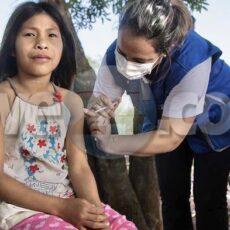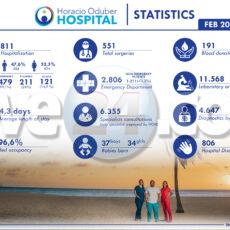

As services reopen and activities resume after COVID-19 confinement, PAHO calls for early detection and successful treatment of all cases to save lives and progress toward TB elimination.
| Washington, DC, March 24, 2020 (PAHO) – On World Tuberculosis (TB) Day, observed today, the Pan American Health Organization (PAHO) warned that diagnosis of new cases of the disease in the Americas declined by 15% to 20% during 2020 compared to the previous year, due to the COVID-19 pandemic. The reduction jeopardizes progress toward ending TB in the region. “TB continues to take a devastating toll on the world, and it is unacceptable that people are suffering and dying from something preventable and curable,” said PAHO Director Carissa F. Etienne. “Health services have suffered during the pandemic. We need to do better. We need to diagnose more people so they can be treated and cured. We need to keep our commitments to reduce the burden of TB in our region and around the world.” Preliminary data received by PAHO indicate that cases went undiagnosed by health services last year and that there was continuity in transmission of the infection. By the last quarter of 2020, in several countries, case notification had been improving, thanks to efforts made by national TB programs to reactivate case search interventions. Preventive respiratory protection measures such as the use of masks, which were widely adopted to prevent COVID-19, could have contributed to lower transmission of TB and other respiratory infections at the community level. However, corroborating data is not yet available. During the last year, the social determinants of TB, such as poverty, malnutrition, unemployment and housing conditions, have deteriorated in marginalized and socially vulnerable communities, which can facilitate development of the disease. So far there is no information on the effect of the pandemic on TB mortality, but it is expected that the impact has been negative, as it has been with case detection. “We need to ensure access to essential TB diagnostic services and timely treatment to save lives and avoid multi-drug-resistant (MDR) TB, which is more difficult to treat,” said Rafael Lopez Olarte, PAHO/WHO regional TB advisor. He highlighted the actions taken by countries to maintain patient treatment during the pandemic, such as Video Directly Observed Therapy and follow-up telephone calls, as well as weekly or monthly dispensing of medication without the patient having to go to a health facility. TB is one of the deadliest infections in the world. According to the latest available data, an estimated 290,000 people fell ill with TB in 2019 in the Americas, and of these, 54,000 were not diagnosed or their cases were not reported. Brazil, Peru, Mexico, Colombia and Haiti accounted for almost 70% of reported cases. In addition, 22,900 people died in 2019 from TB in the region, 5,900 of whom were living with HIV. More efforts toward elimination The Americas, with 2.9%, and Europe, with 2.5%, are the regions with the lowest TB burden in the world. However, the COVID-19 pandemic has jeopardized the gains made in the fight to end the disease by 2050 globally. “Our Region is at the forefront of TB elimination, but a constant effort must be made to maintain the gains. This requires the concerted action of all sectors to provide the necessary services, health personnel trained in detection, a network of laboratories for diagnosis, the availability of recommended drugs, and a whole system of support so that the affected person can comply with the treatment to the fullest,” López Olarte said. The active search for people who have had contact with someone with TB in order to provide them with preventive treatment is also part of the strategy recommended by PAHO/WHO. Ensuring the full implementation of these measures will substantially reduce not only transmission of infection and disease, but also development of drug resistance. Peru and Brazil account for 52% of all multi-drug-resistant TB cases on the continent. The clock is ticking on ending TB World TB Day takes place on March 24 each year to raise awareness of the terrible social, economic and health consequences of tuberculosis and to accelerate efforts to end the global epidemic. This date commemorates the day on which Dr. Robert Koch announced in 1882 that he had discovered the bacterium that causes TB, making it possible to diagnose and cure the disease. The slogan for World TB Day 2021 – “The Clock is Ticking ” – conveys the idea that there is limited time to act on the commitments made by world leaders to end TB. This is especially critical in the context of the COVID-19 pandemic, which jeopardizes progress toward ending TB and toward ensuring equitable access to needed prevention and care, framed by WHO’s drive to achieve universal health coverage. “We need to uphold our commitments to reduce the burden of TB in our region and around the world,” Dr. Etienne said. “If there’s one thing I hope we take from this pandemic, it’s an appreciation for the power of health – and how good health is central to the wellbeing of societies.” |











